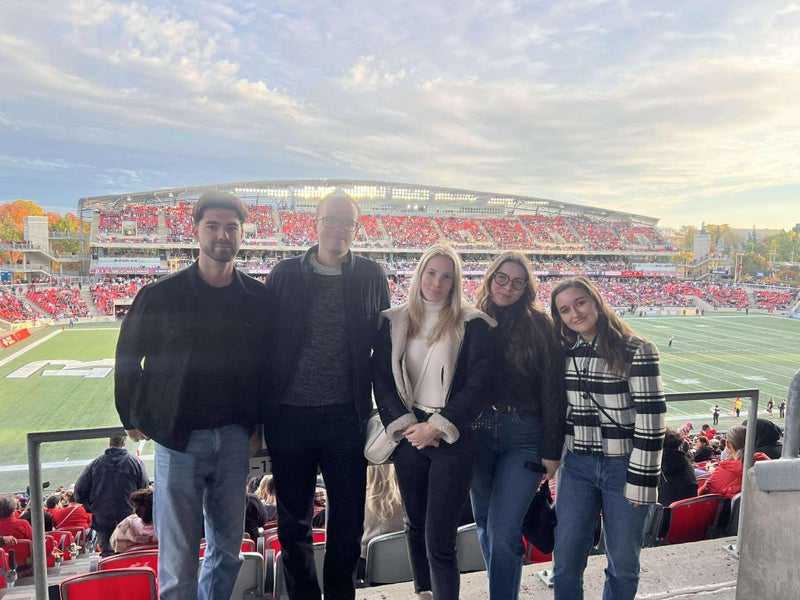Value of persistence and maintaining the right mindset: Corvinus secures third place at Canadian competition
_20251106042712.png)
Our undergraduate students Kata Kukorelli, László Kruppa, Lea Novák, and Réka Kristán represented Corvinus University of Budapest at the Rotterdam–Carleton International Case Competition (RO/CA), co-organized by Carleton University’s Sprott School of Business and Rotterdam Business School between 19–24 October 2025 in Ottawa, Canada.
The students were selected to compete after completing the Cases on International Business Strategy and other Case Track courses. Dániel Kostyal, PhD student at Corvinus, lecturer of the Entrepreneurship and Innovation Institute, prepared the team for the competition and accompanied them as academic advisor during the week. The preparation spanned over three months, during which the team solved six practice cases focused on the Canadian market and companies.
“We laid emphasis on simplifying the case solving process and standardizing the output as much as possible, while leaving room to creative thinking and small innovative ideas. The Team established its own process for approaching and tackling case challenges. We also worked on team dynamics, presentation workshops, workshop sessions related to brainstorming, analysing and presenting
alternatives.” highlighted Dániel Kostyal, the team’s advisor, about the preparation process.
“Our teamwork improved steadily as we got to know each other better. By the time we began working on the competition cases, we had a clear understanding of each member’s strengths, which allowed us to collaborate efficiently. Our team dynamic was supportive, and we enjoyed working together. Everyone contributed their expertise while staying open to feedback and discussion.” added Kata Kukorelli regarding teamwork.
“During the solvings, Kata was responsible for the analysis, Laci for the finance, Lea and me for the implementation. We discussed the analysis, and the strategy together all the time, and the flow of the presentation as well which was always liked by the judges. The dynamics were very great.” explained Réka Kristán.
Teams were given the names of the case companies a week prior to the competition, allowing them to conduct preliminary research.
“All four companies were provided one week prior to the competition. Based on the provided database for companies and their names, we had a good initial guess on the case challenge. We sometimes guessed it right, sometimes did not. Also, the order of the cases was given on Sunday evening.” explained Réka Kristán.
During the competition, teams were asked to solve three six-hour case studies, each followed by a 15-minute presentation and a 10-minute Q&A. What makes RO/CA’s format particularly challenging is that teams have no downtime between submitting their solutions and presenting, they hand in their slides and head straight to the judges. Moreover, the divisional rounds follow a head-to-head
format, where teams compete within their divisions through staggered match schedules and company Q&A sessions, where judges can allocate a total of 13 points in each match between the two teams, based on the comparative performance of the two teams in a match.
In the first case, teams developed an expansion strategy for Wills Transfer, a 3PL logistics company. The Corvinus team opted for a focused niche strategy, winning against the University of Vermont. The second case asked teams to determine how to implement AI for CWD, an IT service provider. Corvinus chose an internal implementation approach, which led to a victory over. The Chinese University of Hong Kong.
As explained by Dániel Kostyal, “the jury highlighted the team’s presentation and Q&A performance, simple but effective structure to convey the solution and the professional attitude and expertise they showed. The team also demonstrated outstanding analytical capabilities and the ability to
uncover insights.”
Finally, the third case involved designing a post-acquisition change management and expansion strategy for Growcer, a vertical farming company, where the Corvinus team again came out ahead, this time against the University of Ottawa.“I believe our success came from consistency and professionalism. Even though the first three rounds presented completely different challenges, we always managed to find a way to succeed by thinking as the company would and by starting each day as a united team, standing by each other throughout the competition” explained Lea Novák.
After winning all three divisional rounds, Corvinus advanced to the Championship Finals, which brought one last case: creating a marketing campaign for the Ottawa Sports and Entertainment Group (OSEG), managing both hockey and American football teams. After the finals, gold medal was
awarded to Wilfrid Laurier University, while McGill University took second place and the Corvinus team earned third place out of six finalists, bringing home the bronze medal.
“The most important thing I learned during the competition was the value of persistence and maintaining the right mindset under pressure. The competition was mentally exhausting as we had to solve cases for three consecutive days, plus one additional case for the finals. As our team
experienced success early on, I also learned the importance of staying humble and grounded. One good performance doesn’t guarantee another, so it was essential to approach each new day with focus, discipline, and a fresh perspective.” summarized Kata Kukorelli.
“As competition coach, I really enjoyed working with the team as they were receptive towards feedback and always tried to improve how they tackle business cases. I am proud of the success they achieved.” concluded Dániel Kostyal about working with the team.We would like to congratulate the team and their mentor for their impressive performance and thank the CIBS course and other Case Track instructors and senior members of Corvinus Case Track Community for their support in aiding the team’s preparation for the competition.
